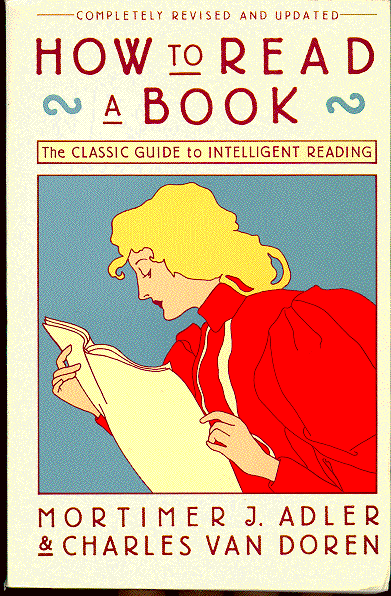
This article was originally published on September 24th, 2007. As we continue to consume more and more online (usually written) content, I think it’s important for us to consider how we read. Whether it’s a book or a blog article, we need to be active readers.
How to Read a Book focuses on two of my favorite topics, communication and epistemology (the study of knowledge – I just think it’s a cool word). The primary author, Mortimer Adler, was the primary force between the development of the Great Books curriculum still used at high schools and colleges in which the focus is on reading and grappling with the canonical texts of Western Civilization.
Central to the book is the idea that someone can and should read a book actively. As I said, in many ways, this is a book on communication. Mortimer points out that to read is really to be engaged in a conversation with the author in an attempt at enlightenment on some topic. He outlines four levels of reading which the reader can use to more actively dive in to a book, from the basic elementary and inspectional levels, to the more in depth analytical reading and finally the syntopical level where you can compare many books on the same topic. Mortimer says that this book is a practical book – and in many ways it is a step by step, rule by rule, way to read a book. The rules are relatively basic, but it’s great to have them laid out in simple terms.
Ideas, Inspirations, and Questions
- I love to read. I do it constantly. How often do I read a book though, and only gloss over it without really engaging with the author and the author’s intent?
- Mortimer points out the necessity of coming to terms with the author, because different people can use the same word with different meanings and inflections. I realize that this is important not only in communicating through the written word, but also in the talking and listening to others. When people use words that commonly have a lot of connotation, I can and should ask them to define it so that I’m clear.
- This book validates my current practice of not accepting everything an author says. But it does reinforce the proper framework – understand the author’s message fully, and then crticially inspect the main points and agree or disagree.
Should you read this book?
Maybe. It’s not the easiest book to read because a)it’s jam-packed – it’s basically a text book b)like a textbook it gets a little stuffy, and c)it’s written by a professor who wants to tell you every little thing he’s thought on a subject. So it takes a little time and focus. If you read a lot, and you read to really engage with the material, then read the first half of the book. The sections on reading specific types of books aren’t as helpful – they’re more common sense. If you are thinking of doing a lot of research on a specific topic – a grad paper for instance, it’s worth reading his chapter on syntopical reading. If the above doesn’t apply, just realize that when you read, consider it a conversation with the author – and pay attention as such.
